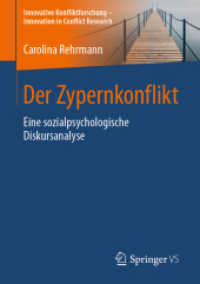Full Description
Writing is challenging for the majority of learners. For students with language problems, difficulties with written expression are considered one of the most common learning challenges. There is much to learn about the ways in which oral language skills impact on the acquisition of written language in children. Writing Development in Children with Hearing Loss, Dyslexia, or Oral Language Problems focuses on the nature of the writing problems experienced by children with oral language problems. Three clinical groups are considered: children with hearing loss, oral language difficulties, and dyslexia. Each contribution comes from an expert or team of experts in these three areas and in the field of language and writing. The volume provides current understandings to help guide and support practitioners and researchers alike. It provides timely information across languages and countries, enhancing our understanding of the links between oral language and written language across languages.
Contents
Foreword ; Introduction ; Part 1 ; Introduction: Models and Perspectives on Writing Development: Implications for Assessment and Instruction ; Chapter 1. Cognitive Processes in Writing: A Framework ; John R. Hayes and Virginia Berninger ; Chapter 2. Linguistic Perspectives on Writing Development ; Ruth Berman ; Chapter 3. Two Metaphors for Writing Research and Their Implications for Writing Instruction ; Pietro Boscolo ; Part 2 ; The impact of oral language skills on written text production ; Chapter 4. Spelling in Deaf Children with Cochlear Implants: Implications for Instruction ; Heather Hayes, Rebecca Treiman, and Ann E. Geers ; Chapter 5. Spelling Acquisition in French Children with Cochlear Implants: A Case-Study Investigation ; Sophie Bouton and Pascale Cole ; Chapter 6. Spelling Abilities in Hebrew-Speaking Children with Hearing Loss ; Ronit Levie, Dorit Ravid, Tal Freud and Tova Most ; Chapter 7. The Influence of Verbal Working Memory on Writing Skills in Children with Hearing Loss ; Barbara Arfe, Federica Nicolini, and Elena Pozzebon ; Chapter 8. Composing Academic Essays: Using Dictation and Technology to Improve Fluency ; John Albertini, Michael Stinson, and Argiroula Zangana ; Chapter 9. Examining Early Spelling and Writing Skills: A Comparative Analysis of Kindergarteners with Speech and Oral Language Impairments and Their Typically Developing Peers ; Cynthia S. Puranik, Stephanie Al Otaiba, and Feifei Ye ; Chapter 10. Morphological Awareness and Spelling Difficulties in French-Speaking Children ; Monique Senechal ; Chapter 11. Writing Abilities of Pre-Adolescents with and without Oral language/Learning Impairment in Restructuring an Informative Text ; Orna Davidi and Ruth A. Berman ; Chapter 12. Writing Development of Spanish-English Bilingual Students with Language Learning Disabilities: New Directions in Constructing Individual Profiles ; Robin L. Danzak and Elaine R. Silliman ; Chapter 13. Written Narratives from French and English Speaking Children with Language Impairment ; Judy S. Reilly, Josie Bernicot, Thierry Olive, Joel Uze, Beverly Wulfeck, Monik Favart, Mark Appelbaum ; Children with Dyslexia ; Chapter 14. A Review of Dyslexia and Expressive Writing in English ; Emma Sumner, Vincent Connelly, and Anna L. Barnett ; Chapter 15. Written Spelling in French Children with Dyslexia ; Severine Casalis ; Chapter 16. Written Spelling in Spanish- Speaking Children with Dyslexia ; Francisca Serrano and Sylvia Defior ; Chapter 17. The Writing Development of Brazilian children with Dyslexia: An Evidence-Based Clinical Approach ; Jane Correa ; Chapter 18. Expressive Writing in Swedish 15-year-olds with Reading and Writing Difficulties ; Asa Wengelin, Roger Johansson and Victoria Johansson ; Chapter 19. Improving Expressive Writing in Learning Disabled Children: The Effects of a Training Focused on Revision ; Martina Pedron, Anna Maria Re, Chiara Mirandola, and Cesare Cornoldi ; Part 3 ; Linking Research to Practice in Oral and Written Language Assessment and Intervention ; Chapter 20. Integrating Language Assessment, Instruction, and Intervention in an Inclusive Writing Lab Approach ; Nickola Wolf Nelson ; Chapter 21. Integrating Oral and Written Language into a New Practice Model: Perspectives of an Oral Language Researcher and Practitioner ; Elaine R. Silliman ; Chapter 22. Integrating Writing and Oral Language Disorders in Assessment: Perspectives of a Writing Researcher ; Vincent Connelly ; Chapter 23. The Role of Oral Language in Developing Written Language Skills: Questions for European Pedagogy? ; Julie Dockrell and Barbara Arfe ; Bridging Research and Practice: Conclusions








